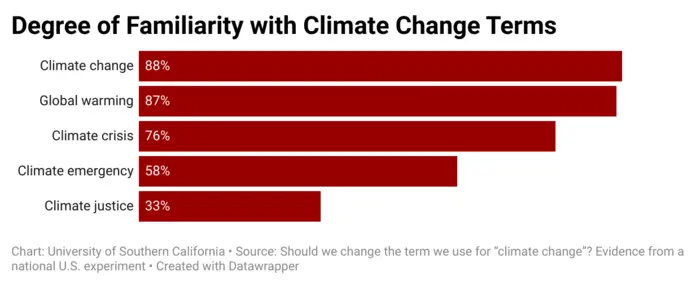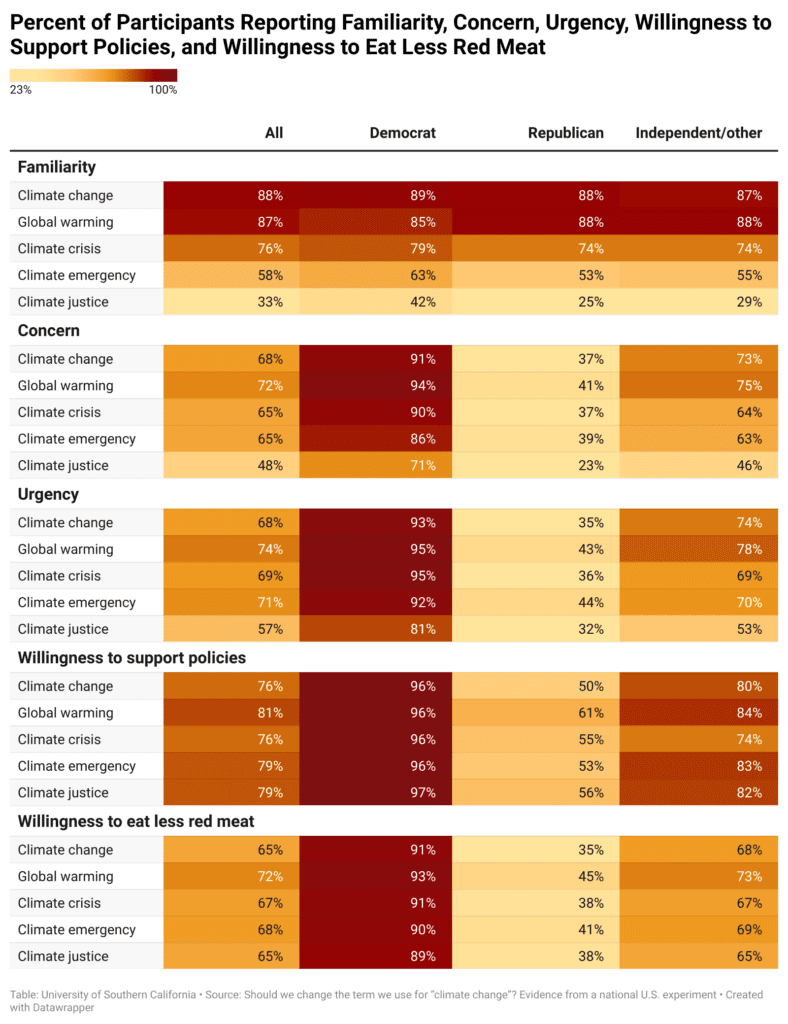USC study reveals that people are more familiar with tried-and-true names for climate change – including climate change.
By Lance Ignon | University of Southern California
The terms “climate change” and “global warming” are not only more familiar to people than some of their most common synonyms, but they also generate more concern about the warming of the Earth, according to a USC study published in the journal Climatic Change.
The study began by looking at how familiar people are with the terms “global warming,” “climate change,” “climate crisis,” “climate emergency,” and “climate justice.” Close to 90% of respondents were familiar with “climate change” and “global warming.” But familiarity dropped off sharply for the other terms, with only 33% of the respondents recognizing “climate justice.”
“Terms that are familiar are more likely to resonate with people,” said lead author Wändi Bruine de Bruin, director of the Behavioral Science & Policy Initiative at the USC Schaeffer Institute for Public Policy & Government Service. “It’s harder to feel concern about something you’re not sure you’ve heard of.”

The study also looked at the degree to which each term generated concern, urgency, willingness to support climate-friendly policies and willingness to eat less red meat. (The production of red meat is a major contributor to climate change and other environmental impacts, so eating less of it can lower one’s environmental footprint.) Finally, the study examined how perceptions differed based on political affiliation.
Overall, according to the study, “climate change” and “global warming” were rated as most familiar, most concerning, and most urgent, and “climate justice” the least, with ratings for “climate crisis” and “climate emergency” falling in between. The overall support for climate policy and willingness to eat less red meat was roughly the same, independent of the terms that were used (see Table).
Results were strikingly different by political party affiliation. For example:
- 91% of Democrats and 74% of Independents expressed concern about “climate change.” Only 37% of Republicans expressed concern.
- Seventy-one percent of Democrats were concerned about “climate justice,” versus 46% of Independents, and 23% of Republicans. The paper noted that familiarity and concern for “climate justice” may be lower because fewer people recognize the term and/or because it is more politically polarizing.
- When the term “global warming” was associated with willingness to support policies, 96% of Democrats were on board, compared to 85% of Independents and 61% of Republicans.
- A majority of respondents overall said they were willing to eat less red meat regardless of which term the action was associated with. But broken down by party affiliation, less than half of Republicans said they’d eat less meat, whereas 89% or more of Democrats supported the action. Independents fell somewhere in between.

The study included 5,137 U.S. residents randomly selected from the Understanding America Study at USC Dornsife’s Center for Economic and Social Research.
Study co-authors included Laurel Kruke, a Ph.D. student at the USC Rossier School of Education; Gale M. Sinatra, Stephen H. Crocker Chair, Professor of Education and Psychology and Associate Dean for Research at USC Rossier; and Norbert Schwartz, Provost Professor of Psychology and Marketing at USC Dornsife and the USC Marshall School of Business. In addition to being the lead author, Bruine de Bruin is Provost Professor of Public Policy, Psychology, and Behavioral Science at the USC Price School of Public Policy and USC Dornsife College of Letters, Arts and Sciences.
***
The study was funded in part by the USC Dornsife Wrigley Institute for Environment and Sustainability. Bruine de Bruin received additional support from the Golden Belt Community Foundation.
About the Schaeffer Institute
The USC Leonard D. Schaeffer Institute for Public Policy & Government Service develops evidence-based solutions to the nation’s most pressing policy issues and fosters civic engagement among the next generation of public service leaders. Established by an historic gift from Leonard D. Schaeffer, it houses two flagship programs: the Leonard D. Schaeffer Center for Health Policy & Economics and the Leonard D. Schaeffer Fellows in Government Service.
The Schaeffer Institute is also home to the Behavioral Science and Policy Initiative. The initiative conducts behavioral science research to inform policies on climate change, health, food insecurity, and other key policy topics, through direct interaction with policymakers.
Journal Reference:
Bruine de Bruin, W., Kruke, L., Sinatra, G.M., Schwarz, N., ‘Should we change the term we use for “climate change”? Evidence from a national U.S. terminology experiment.’ Climatic Change 177, 129 (2024). DOI:10.1007/s10584-024-03786-3 | https://doi.org/10.1007/s10584-024-03786-3
Article Source:
Press Release/Material by USC Schaeffer | USC
Featured image credit: Freepik




